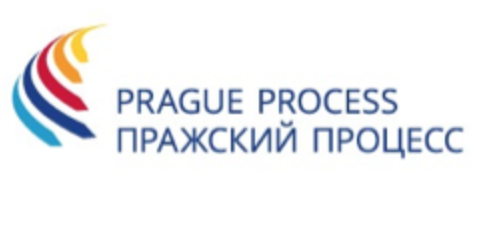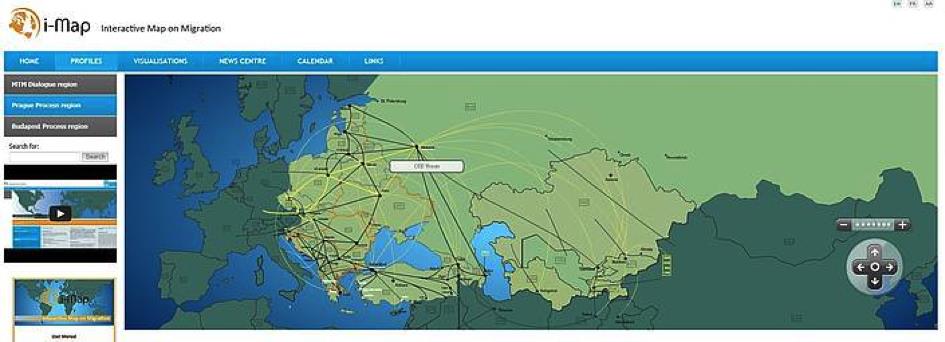The Prague Process

The Prague Process is a political initiative based on positive outcomes of the Building Migration Partnerships (BMP) project realized from January 2009 to June 2011. On 28 April 2009 the BMP Ministerial Conference in Prague adopted a Joint Declaration on the principles and elements for promoting migration partnerships between the participating states. The text of the BMP Joint Declaration, which set the principles for the Prague Process, was prepared by all BMP participating states, with active participation of EU bodies (European Commission, Frontex, Europol, European Training Foundation) and international organisations (ICMPD, IOM, MARRI and UNHCR).
It has 50 members including European Union, Schengen Area, Western Balkans, Central Asian countries, as well as Russia and Turkey. Members of Prague Process; Albany, Armenia, Austria, Azerbaijan, Republic of Belarus, Belgium, Bosnia and Herzegovina, Bulgaria, Croatia, Cyprus, the Czech Republic, Denmark, Estonia, Finland, France, Georgia, Germany, Greece, Hungary, Ireland, Italy, Kazakhstan, Kosovo/UNSCR 1244/1999, Kyrgyzstan, Latvia, Liechtenstein, Lithuania, Luxembourg, the former Yugoslav Republic of Macedonia, Malta, Montenegro, the Netherlands, Norway, Poland, Portugal, the Republic of Moldova, Romania, the Russian Federation, Serbia, Slovakia, Slovenia, Spain, Sweden, Switzerland, Tajikistan, Turkey, Turkmenistan, Ukraine, the United Kingdom, Uzbekistan and the European Commissioner responsible for Migration.
The 2nd Ministerial Conference The Prague Process - Building Migration Partnerships in Action took place in Poznan on 4 November 2011 and the Action Plan 2012-2016 was endorsed by the participating states. In the action plan it was envisaged that implementation of the decisions taken in the Action Plan will be monitored by holding a senior officials meeting at least once a year. The Action Plan 2012 – 2016 has brought to the list of the main principles of the Prague Process the sixth topic – the strengthening capacities in the area of asylum and international protection.
· Preventing and fighting illegal migration;
· Promoting the readmission, voluntary return and sustainable reintegration process;
· Legal migration and human mobility with a special emphasis on labour migration;
· Integration of legally residing migrants;
· Turning the migration and mobility into a positive power;
· Building capacity in asylum and international protection.
Prague Process 3rd Ministerial Conference was held in Bratislava in Slovak Republic on 19-20 September 2016. 3rd Ministerial Conference Joint Declaration that shapes the studies for new five-year period (2017-2021) of Prague Process has been adopted.
Prague Process Targeted Initiative (PP TI)
Implementation of seven Pilot Projects in the area of migration, development of migration profiles and of the interactive online map of Eastern migratory routes (i-Map) as well as strengthening of cooperation between the Prague Process National Contact Points are amongst the most important goals of the Prague Process Targeted Initiative.
On 2 August 2012 the Ministry of Interior of the Republic of Poland and the European Commission signed a contract for implementation of the Prague Process Targeted Initiative and the project “Support for the Implementation of the Prague Process and Its Action Plan”. The project was initially foreseen to last three years. On 23 December 2013, the Addendum to the Grant Contract was signed, which extended the project to 42 months.
The main objective of the project implemented jointly by Poland (which is a leader and coordinator of the Targeted Initiative), Czech Republic, Germany, Hungary, Romania, Slovakia, Sweden and the International Centre for Migration Policy Development (ICMPD) in Vienna is to strengthen cooperation on migration and asylum between the Prague Process participating states (EU and Schengen Area, the Eastern Partnership, the Western Balkans, the Central Asia and Russia and Turkey). Within the framework of the project expert dialogue and exchange of information between participants has been strengthened, mainly through the development of cooperation between the Prague Process National Contact Points and organisation of expert-level thematic meetings. The so-called Knowledge Base which consists of migration profiles describing migratory situation of the Prague Process participating states has been expanded. The interactive online map of Eastern migratory routes (i-Map) has been continuously further updated.
Four Pilot Projects were implemented within the framework of the Prague Process Targeted Initiative in 2012 – 2014 and the Addendum signed in December 2013 allowed for development of three new Pilot Projects being implemented in 2014 - 2015.
Activities undertaken within the Pilot Projects are coordinated with the work of the Eastern Partnership Panel for Migration and Asylum, the secretariat of which is co-financed by the Prague Process Targeted Initiative.
The European Commission allocated for the Prague Process Targeted Initiative 3 million euro, which amount was raised in December 2013 to 3,6 million euro.
Implemented Pilot Projects are;
Pilot project 1:
· Poland, Romania and Slovakia are the Leading States of the Pilot Project on illegal migration.
· The main objective of the Pilot Project on Illegal Migration implemented within the framework of the PPTI was to strengthen the capacity of countries participating in the Prague Process in the field of combating illegal immigration through the transfer of knowledge on the process of concluding of readmission agreements as well as through sharing of experience in organising returns of migrants.
· Implementation period: August 2012 – July 2014.
· Except for the Leading States, the following Prague Process countries participate in the Pilot Project: Armenia, Austria, Azerbaijan, Belarus, Bosnia and Herzegovina, Croatia, Denmark, Georgia, Hungary, Kosovo (UNSCR 1244/1999), Liechtenstein, Moldova, Russia, Serbia, Turkey and Ukraine. Moreover, the Project is being supported by experts from Frontex and IOM.
Pilot Project 2:
· Hungary is the leading state of the Pilot Project on legal migration.
· The purpose of the proposed pilot project was to share experiences and best practices in organising labour migration.
· As a result participating countries were able to strengthen their cooperation and improve their capacities in the area and the work thus resulted in the joint Prague Process Handbook on Managing Labour and Circular Migration.
· Implementation period: August 2012 – October 2014.
· The following Prague Process countries participate in the Pilot Project: Albania, Armenia, Belarus, Bosnia and Herzegovina, Croatia, Finland, Georgia, Kosovo (UNSCR 1244/1999), Kyrgyzstan, Moldova, Russia, Sweden, Tajikistan, Ukraine; IOM.
Pilot Project 3:
· The Czech Republic is the leading state of the Pilot Project on migration and development.
· The full title of the project was "Making Migration and Mobility Positive Forces for Development"
· The main aim of the Pilot Project is to develop a Comprehensive study on policies and legislation in countries of origin and destination to successfully manage circular migration and promote its impact on development.
· Implementation period: August 2012 – October 2014.
Pilot Project 4:
· The pilot project ‘Quality and training in the asylum processes’ was implemented within the framework of the Prague Process Targeted Initiative. The pilot project was led by Sweden (Swedish Migration Board) with the support of Germany (Federal Office for Migration and Refugees) in close cooperation with EASO, UNHCR and ICMPD.
· The pilot project aimed at exploring the possibility of a broader implementation of the training program of the European Asylum Support Office (EASO). The project explored the training needs in the partner countries; identified areas where the EU MS could provide support and assessed how information and best practices could be shared between the countries.
· Implementation period: August 2012 – April 2014 with extended training activities for Turkey till November 2014.
· The following Prague Process countries participate in the Pilot Project: Albania, Armenia, Belarus, Belgium, Bosnia and Herzegovina, , Georgia, Hungary, Kosovo (UNSCR 1244/1999), Kyrgyzstan, Liechtenstein, France, Macedonia, Moldova, the Netherlands, Poland, Russia, Serbia, Turkey, Ukraine, United Kingdom; the Pilot Project is also supported by experts from UNHCR and EASO.
Pilot Project 5:
· The new pilot project prepared on irregular migration has been implemented in the leadership of Romania and Poland.
· The aim of the project has been to enhance the capacity of the participant countries within the framework of Detecting the Identity and/or Nationality of the Irregular Migrants.
· Workshops were organized in November 2014-December 2015.
Pilot Project 6:
· The new pilot projects were led by Czech Republic and Hungary.
· Main objective is to find current policies regarding trans-border mobility of students in the Prague Process area and discuss these policies in order to determine good implementations and policy recommendations to support the student exchange between participant countries.
· Implementation period is (November 2014-December 2015) 14 months.
· Survey studies, guide preparation and workshops were organized within the project.
Pilot Project 7:
· Pilot Project 7 (Qualified Decision Making during the Process-Assessment based on Evidence, Legal Process and Legal System) will continue its activities regarding the quality enhancement in the asylum process by focusing on decision. The Pilot Project aims to introduce learning through case study session with advanced seminar concept regarding subjects chosen related with the social workers and decision makers.
· It will be led by Germany (Federal Office for Migration and Refugees), Sweden (Swiss Migration Board). Cooperation with the EASO and UNHCR has been planned to continue.
· Main target groups are social workers and decision makers in Determining the Refugee Status. Special focus point is on the approach of determining the national educators in the participant countries as the facilitator of the case study sessions.
· The implementation period of the project is (November 2014-December 2015) 14 months.
Prague Process Knowledge Base
The Prague Process Knowledge Base builds upon the BMP one and gathers information in the form of a set of (Extended) Migration Profiles, which are based on the template prepared by the European Commission.
The interactive online map – PP i-Map – was developed to ensure access to the available information to all Prague Process / BMP participating states at www.imap-migration.org, under the section “Prague Process”.
In the course of the Prague Process Targeted Initiative the Knowledge base will further be developed and improved. As of 2012, the participating states have been discussing and developing a Migration Profile "Light" template with the aim to ensure information in this format in the i-Map on all 50 participating states.

For more detailed information, you can reach the Prague Process webpage by the link below:
https://www.pragueprocess.eu/en/

